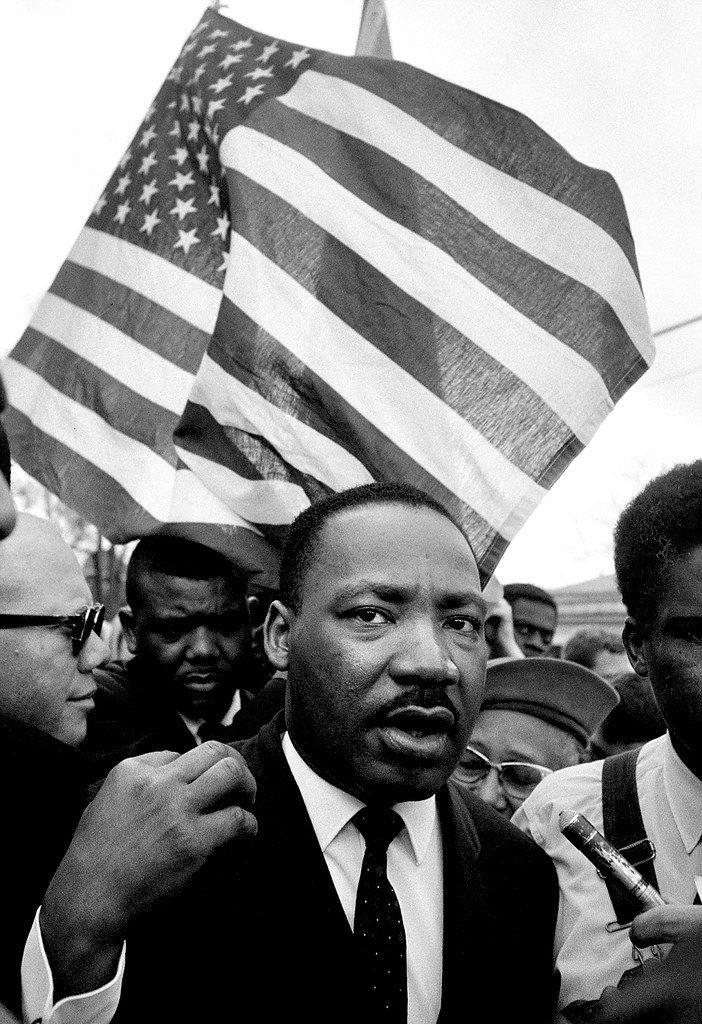ICON OF CIVIL RIGHTS AND SYMBOL OF THE STRUGGLE FOR EQUALITY
Martin Luther King Jr. – a name that has become synonymous with the civil rights movement and the fight for equality in the United States. Through his life and activism, he left an indelible mark on history, inspiring millions of people worldwide. Let’s take a closer look at this remarkable leader and champion of justice.
Martin Luther King Jr. was born on January 15, 1929, in Atlanta, Georgia. Raised in a religious family where his father was a minister, he received his early education and became one of the most respected clergymen and public figures of his time.
Martin Luther King Jr. has gone down in history as a great leader of the civil rights movement in the United States. His active role began with his participation in the Montgomery Bus Boycott in 1955, which arose after the arrest of an African American woman named Rosa Parks for refusing to give up her seat to a white passenger.
Martin Luther King Jr. demonstrated determination in the fight for civil rights, becoming the organizer and leader of the bus boycott, which lasted for 381 days. During this period, African Americans refused to use public transportation in the city as a protest against systemic racial inequality.
The success of the boycott culminated in a victory in the landmark case «Brown v. Board of Education», in which the U.S. Supreme Court declared racial segregation in education illegal. This was a crucial step towards overcoming systemic racism and opening up new opportunities for African Americans.
The methods employed by Martin Luther King Jr. in the civil rights movement were inspired by the ideals of nonviolent resistance put forth by Mahatma Gandhi. King advocated for peace and tolerance, even in the face of opposition and violence from opponents.
The Montgomery Movement elicited mixed reactions from society and the government. On one hand, it drew attention to the issue of racial discrimination and became a powerful catalyst for change. On the other hand, activists and supporters of the movement faced pressure and discrimination.
«Dreams of Equality»: Famous Speech in Washington
In 1963, Martin Luther King delivered his famous «I Have a Dream» speech in front of a crowd of over 250,000 people during the March on Washington. This speech became a symbol of hope and the aspiration for equality for all, regardless of race.
King began his speech with the recurring words «I have a dream» and painted a vivid picture of how he envisioned the future, where people would be judged not by the color of their skin but by their qualities and character. His words became a mantra for those striving for a society based on principles of equality and justice.
Expressing hope that one day children would be judged not by their race but by their personal qualities, King dreamed of a time when national character would be defined by character content, not skin color. His visionary speech became a catalyst for further efforts in racial integration and achieving the dream of brotherhood among people.
The speech was delivered to a massive gathering on the steps of the Lincoln Memorial. Its emotional power, penetrating every word, made it remarkably influential. King not only conveyed his ideas but also ignited the energy of many present, inspiring them to actively participate in the fight for equality.
The «I Have a Dream» speech served as a catalyst for legislative changes. In 1964, the Civil Rights Act was passed, prohibiting discrimination based on race, color, religion, or national origin. This law put an end to formal racial segregation and was a significant step toward achieving the goals expressed in the speech.
Martin Luther King’s speech has become an integral part of his legacy. Its values and ideals remain relevant in the modern world, reminding us of the importance of advocating for justice and equality, and emphasizing that words can be a powerful tool for changing public opinion and structure.
Thanks to the efforts of Martin Luther King Jr. and other civil rights leaders, the Civil Rights Act was passed in 1964, and the Voting Rights Act followed in 1965. These laws ended racial discrimination and granted African Americans equal voting rights.
In 1964, Martin Luther King Jr. was awarded the Nobel Peace Prize for his fight for civil rights and nonviolent methods of protest. His activism extended beyond racial issues; he also spoke out against the Vietnam War and advocated for the poor and world peace.
On April 4, 1968, Martin Luther King Jr. was assassinated in Memphis, Tennessee. His untimely death was not only a tragedy for his family and supporters but also a shock to the entire nation and the world. Nevertheless, his legacy lives on in the spirit of civil activism and the fight for the rights of all people.
The death of Martin Luther King Jr. left a significant void at the forefront of the civil rights movement. However, instead of giving up, his followers and supporters continued to fight for his ideals and the completion of the reforms he initiated.
Although Martin Luther King Jr. has passed away, his ideals continue to thrive in the hearts of those who believe in equality and justice. The principles of civil activism and nonviolent resistance against discrimination and inequality have become important guiding principles for many movements and activists.
In 1983, Martin Luther King Jr. Day was established to honor his contributions to the civil rights movement. This day became a national holiday and a time for reflection and support for the ideals championed by this remarkable leader.
Martin Luther King Jr. holds an esteemed place in history as a leader of the civil rights movement. His speeches, his commitment to peace and truth, his ability to inspire and mobilize the masses have left an indelible mark that will be remembered for generations.








